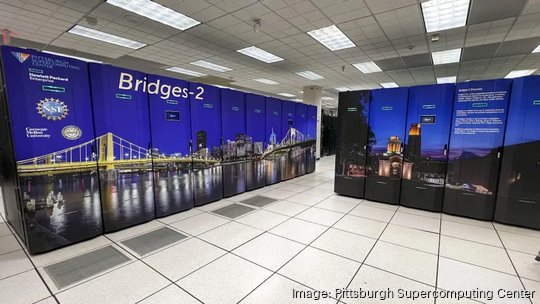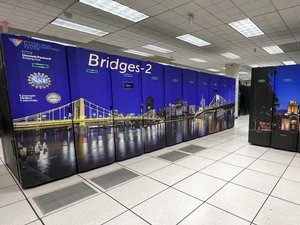
A new, highly sophisticated computing system will arrive in Pittsburgh in less than a year.
The Anton family of supercomputers were designed in 2008 by D. E. Shaw Research, a New York-based firm. A special-purpose system, Antons are designed to simulate proteins and macromolecules on an atomic level. Research from Anton systems have led to advancements in treatment of several different conditions, including neurological conditions such as Alzheimer's and Parkinson's, as well as breakthrough discoveries that led to treatments and vaccine development for Covid-19.
The Pittsburgh Supercomputing Center, a joint effort between Carnegie Mellon University and the University of Pittsburgh, has utilized an Anton system since 2010 and now a $3.15 million award from the National Institutes of Health will fund a new, third-generation system's operations for the next five years.
Computational components are incredibly in demand at the moment. The extremely complicated production process of semiconductors combined with a massive increase in demand due to the artificial intelligence boom has led to inadequate supply. Supercomputers have seen advancements alongside the AI race, and the federal government began utilizing PSC's systems earlier this year to better understand the technology.
While there are a vast number of supercomputers compared to when the term was invented in the 1960s, Anton presents a key advantage to biomolecular researchers — the specialized design of the systems make them much faster for simulated research.
"Anton 3's highest-performing competitor is an Nvidia A100, a relatively late model GPU," D. E. Shaw Research physical design lead Adam Butts said during a talk in 2021. "Running [our optimized research] code on a chip-for-chip basis, Anton 3 is about 20 times faster than A100. This is not to pick on Nvidia, the A100 is a tremendously capable compute engine. Rather, this illustrates the tremendous benefit we achieve from specialization."
When Anton 3 arrives at PSC in 2025, computer space will be allocated to researchers from universities and nonprofit institutions by an independent committee convened by the National Research Council and the National Academy of Sciences. Applicants do not need to be involved with CMU or Pitt, nor do they need to have prior Anton experience. The project will be led by PSC Scientific Director Philip Blood and Senior Computational Scientist Marcela Madrid.
"With the latest Anton system, we will be able to provide researchers with a unique resource capable of producing results in days that would take years on any other resource," Blood said in a prepared statement. "The new system will spark innovative studies that will challenge and shift current paradigms in the simulation of biomolecular systems."








